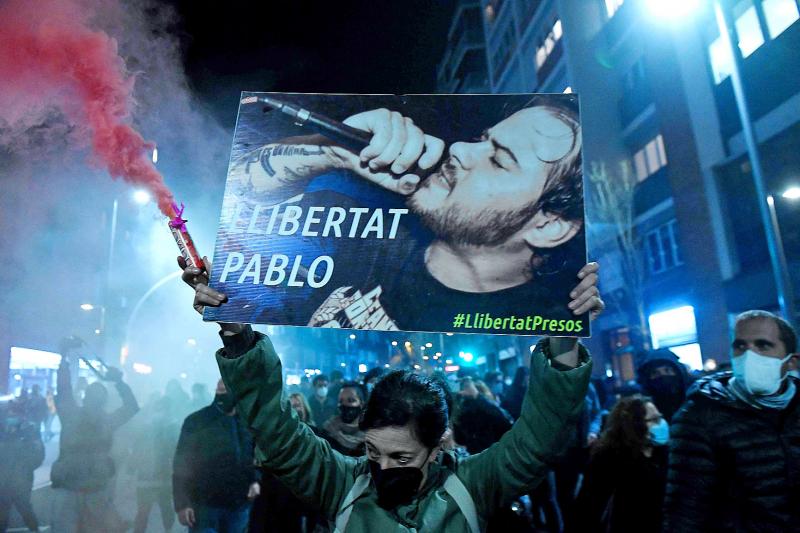Spanish police and protesters on Thursday clashed for a third night over the jailing of a rapper for controversial posts on Twitter, triggering a political backlash.
Dozens of people have been arrested since Tuesday night when angry demonstrations erupted after police detained Pablo Hasel, 32, who was holed up in a university in Catalonia to avoid going to jail in a highly contentious free speech case.
The violence has thrust the hard left Podemos party — the junior partner in Spain’s left-wing coalition, which has opposed Hasel’s jailing and publicly supported the protesters — into the firing line.

Photo: AFP
Police reported six arrests in Barcelona on Thursday after protesters set up barricades, prompting police to fire tear gas.
The center of the Catalan capital was filled with burning trash cans and furniture. Hooded youths hurled stones and bottles at police vans, and damaged some vehicles.
The newsroom of the newspaper El Periodico de Cataluna was attacked, while TVE television showed images of clashes in the eastern city of Valencia.
On Wednesday night, hundreds of people gathered in Madrid’s Puerta del Sol square calling for Hasel’s release, hurling bottles at police, who charged at them in clashes lasting several hours, reporters said.
Police arrested 19 people, while the city’s emergency services said that 55 people were injured, among them 35 police officers.
In Barcelona and three other Catalan cities, demonstrators lobbed objects at police and set barricades ablaze on Wednesday, with police charging the protesters and in some places firing foam rounds.
About 50 people were arrested across the country.
The director of Catalonia’s regional police force, Pere Ferrer, said officers faced a “highly complex scenario” because of the “high volume of public disorder,” which included looting.
The force has opened an investigation after a young woman lost an eye on Tuesday night in Barcelona as a result of a foam projectile used by police to dispel the protesters, he added.
Hasel, known for his hard-left views, was arrested after failing to turn himself in to start a nine-month sentence over posts calling former Spanish king Juan Carlos I a mafia boss, and accusing police of torturing and killing demonstrators and migrants.
A court in his hometown of Lerida on Friday last week sentenced the rapper to another jail term of two-and-a-half years for threatening to kill a man at a bar, a ruling published on Thursday showed.
In the immediate firing line was Podemos lawmaker Pablo Echenique, who wrote on Twitter his backing for the protesters as the clashes were raging.
“All my support to the young anti-fascists who are demanding justice and freedom of expression in the streets,” Echenique wrote.
However, much anger was directed at Podemos leader Pablo Iglesias — also a deputy prime minister — who has criticized Hasel’s jailing and used it to question Spain’s democracy.

‘IN A DIFFERENT PLACE’: The envoy first visited Shanghai, where he attended a Chinese basketball playoff match, and is to meet top officials in Beijing tomorrow US Secretary of State Antony Blinken yesterday arrived in China on his second visit in a year as the US ramps up pressure on its rival over its support for Russia while also seeking to manage tensions with Beijing. The US diplomat tomorrow is to meet China’s top brass in Beijing, where he is also expected to plead for restraint as Taiwan inaugurates president-elect William Lai (賴清德), and to raise US concerns on Chinese trade practices. However, Blinken is also seeking to stabilize ties, with tensions between the world’s two largest economies easing since his previous visit in June last year. At the

UNSETTLING IMAGES: The scene took place in front of TV crews covering the Trump trial, with a CNN anchor calling it an ‘emotional and unbelievably disturbing moment’ A man who doused himself in an accelerant and set himself on fire outside the courthouse where former US president Donald Trump is on trial has died, police said yesterday. The New York City Police Department (NYPD) said the man was declared dead by staff at an area hospital. The man was in Collect Pond Park at about 1:30pm on Friday when he took out pamphlets espousing conspiracy theories, tossed them around, then doused himself in an accelerant and set himself on fire, officials and witnesses said. A large number of police officers were nearby when it happened. Some officers and bystanders rushed

Beijing is continuing to commit genocide and crimes against humanity against Uyghurs and other Muslim minorities in its western Xinjiang province, U.S. Secretary of State Antony Blinken said in a report published on Monday, ahead of his planned visit to China this week. The State Department’s annual human rights report, which documents abuses recorded all over the world during the previous calendar year, repeated language from previous years on the treatment of Muslims in Xinjiang, but the publication raises the issue ahead of delicate talks, including on the war in Ukraine and global trade, between the top U.S. diplomat and Chinese

RIVER TRAGEDY: Local fishers and residents helped rescue people after the vessel capsized, while motorbike taxis evacuated some of the injured At least 58 people going to a funeral died after their overloaded river boat capsized in the Central African Republic’s (CAR) capital, Bangui, the head of civil protection said on Saturday. “We were able to extract 58 lifeless bodies,” Thomas Djimasse told Radio Guira. “We don’t know the total number of people who are underwater. According to witnesses and videos on social media, the wooden boat was carrying more than 300 people — some standing and others perched on wooden structures — when it sank on the Mpoko River on Friday. The vessel was heading to the funeral of a village chief in